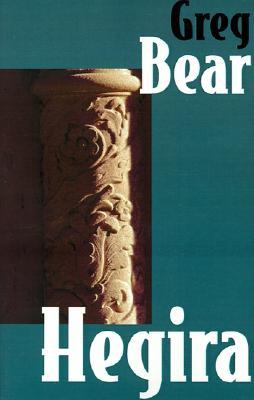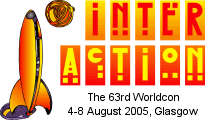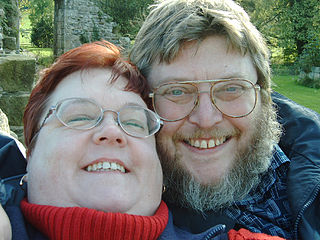
Geoffrey Charles Ryman is a Canadian writer of science fiction, fantasy, slipstream and historical fiction.

Diana Wynne Jones was a British novelist, poet, academic, literary critic, and short story writer. She principally wrote fantasy and speculative fiction novels for children and young adults. Although usually described as fantasy, some of her work also incorporates science fiction themes and elements of realism. Jones's work often explores themes of time travel and parallel or multiple universes. Some of her better-known works are the Chrestomanci series, the Dalemark series, the three Moving Castle novels, Dark Lord of Derkholm, and The Tough Guide to Fantasyland.

Jasper Fforde is an English novelist, whose first novel, The Eyre Affair, was published in 2001. He is known mainly for his Thursday Next novels, but has published two books in the loosely connected Nursery Crime series and the first books of two other independent series: The Last Dragonslayer and Shades of Grey. Fforde's books abound in literary allusions and wordplay, tightly scripted plots and playfulness with the conventional, traditional genres. They usually contain elements of metafiction, parody, and fantasy.

The Colour of Magic is a 1983 fantasy comedy novel by Terry Pratchett, and is the first book of the Discworld series. The first printing of the British edition consisted of only 506 copies. Pratchett has described it as "an attempt to do for the classical fantasy universe what Blazing Saddles did for Westerns."

David Rowland Langford is a British author, editor, and critic, largely active within the science fiction field. He publishes the science fiction fanzine and newsletter Ansible and holds the all-time record for most Hugo Awards, with a total of 29 wins.

Interzone is a British fantasy and science fiction magazine. Published since 1982, Interzone is the eighth-longest-running English language science fiction magazine in history, and the longest-running British science fiction (SF) magazine. Stories published in Interzone have been finalists for the Hugo Awards and have won a Nebula Award and numerous British Science Fiction Awards.

Christopher Priest is a British novelist and science fiction writer. His works include Fugue for a Darkening Island, The Inverted World, The Affirmation, The Glamour, The Prestige, and The Separation.

Hegira is a 1979 science fiction novel by American writer Greg Bear. It deals with themes including cyclic time, artificial intelligence, artificial life, and artificial structures of planetary scale.
The Milford Writer's Workshop, or more properly Milford Writers' Conference, is an annual science fiction writer's event founded by Damon Knight, among others, in the mid-1950s, in Milford, Pennsylvania. It was so named because Knight, Judith Merril, and James Blish lived in Milford when it was founded. It moved to the United Kingdom in 1972 and has run successfully ever since on an annual basis.

The 63rd World Science Fiction Convention (Worldcon), also known as Interaction, was held on 4–8 August 2005 at the SEC Centre with the attached SEC Armadillo and Moat House Hotel in Glasgow, United Kingdom. Parties took place at the Hilton Hotel.

Mythago Wood is a fantasy novel by British writer Robert Holdstock, published in the United Kingdom in 1984. Mythago Wood is set in Herefordshire, England, in and around a stand of ancient woodland, known as Ryhope Wood. The story involves the internally estranged members of the Huxley family, particularly Stephen Huxley, and his experiences with the enigmatic forest and its magical inhabitants. The conception began as a short story written for the 1979 Milford Writer's Workshop; a novella of the same name appeared in the September 1981 edition of The Magazine of Fantasy & Science Fiction.

Critical Wave, later subtitled "The European Science Fiction & Fantasy Review", was a British small-press magazine, initially published and co-edited by Steve Green and Martin Tudor during the period 1987-96. There was also a short-lived US edition in the late 1980s.
The Nova Awards were presented annually, between 1973 and 2014, at the UK science fiction convention Novacon and recognised achievement in British and Irish sf fanzines.

Steve Green is a former newspaper reporter (1978–84) turned freelance journalist, who has also written short fiction and poetry. He is an active member of the science fiction press and fan community.
Diana Wynne Jones was a British writer of fantasy novels for children and adults. She wrote a small amount of non-fiction.

Daughter of Tintagel is a series of historical fantasy novels by British writer Fay Sampson. It tells the story of the life of Arthurian legend character Morgan le Fay, presented through an oral history narrative from her early childhood to her disappearance. It was originally published as five books between 1989 and 1992, followed by an omnibus edition in 1992. The series was re-published in 2005 as Morgan le Fay.
Green Eyes is a novel by Lucius Shepard published in 1984.
Fay Sampson is a British writer of speculative fiction, predominantly known for the Daughter of Tintagel, Pangur Ban, and Sorcerer fiction series.













